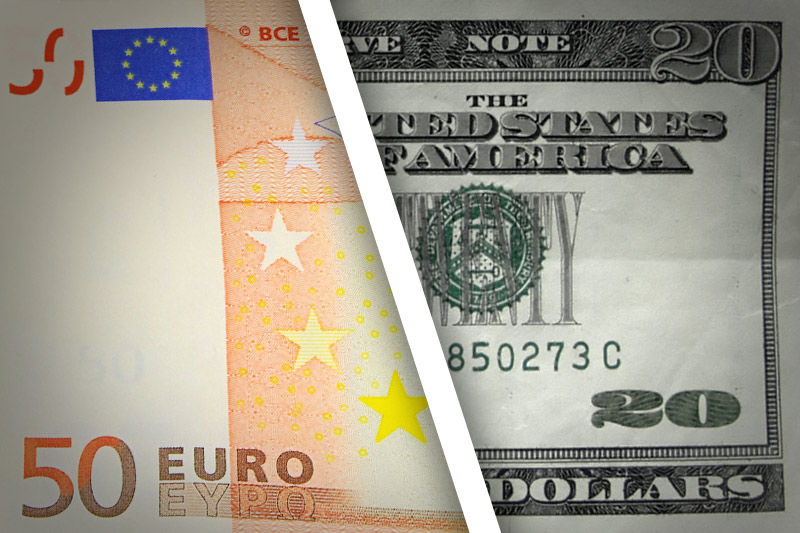Investing.com -- The euro capped the week by extending its rally against the dollar, as stronger than expected U.S. consumer data and concerns related to the Greek debt crisis remained in focus.
EUR/USD gained 0.0046 or 0.49% to 1.0811 in U.S. afternoon trading. Earlier in European trading, the pair reached 1.0849, its highest level since April 8, before wavering throughout a choppy session. For the week, the euro increased by roughly 2% against its U.S. counterpart. Since the start of March, the pair has rarely been outside of a range of 1.05 to 1.10.
The dollar pared earlier losses in U.S. morning trading following the release of stronger than expected consumer data. The U.S. Bureau of Labor Statistics in its monthly report said its Consumer Price Index rose 0.2% for March, slightly below forecasts of a 0.3% increase. A closer reading indicated that prices swung upward in medical care, used car and truck sales and household furnishing, while airlines fares declined for the fourth time and five months.
Soon after, the University of Michigan said its Consumer Sentiment index for the middle of April ticked up to 95.9, up from 93.0 at the end of March. The index reached an eight-year high in January at 98.1 before declining a month later.
Despite the strong indicators, there were still signs of sluggish growth throughout the economy within the report. Low levels for energy prices led to a downward revision in inflation expectations to 2.5% for the remainder of the year, down from an earlier projection of 3.0. The modest inflation expectations may increase the risk that consumers will curb spending while awaiting lower prices.
In addition, the subdued inflation expectations may also fuel speculation that the Federal Reserve could wait until the fall before it decides to raise interest rates.
On Thursday, Federal Reserve Bank of Atlanta president Dennis Lockhart provided little indication that the Fed could institute a highly-anticipated interest-rate hike in June. The Fed is taking a data-driven approach to the timing of its first rate hike in more than five years, as it awaits increases in wage and GDP growth, as well as steady rises in inflation before it raises its benchmark Fed Funds rate.
"The data available for the first quarter of this year have been notably weak…giving rise to heightened uncertainty about the track the economy is on," Lockhart said during a speech in St. Petersburg, Fla.
Elsewhere, Italian prime minister Matteo Renzi attempted to assuage fears of a Greek default on its sovereign debt with reassuring comments in Washington. Speaking at a joint press conference with U.S. president Barack Obama at the White House, Renzi indicated that the euro zone is better prepared to react to a possible departure by Greece from the EU than it was during other economic crises over the last decade.
"The situation in Greece is not the same situation as 2011, its not the same as 2008," Renzi said. "We must absolutely achieve an agreement."
Renzi's comments came two days after German finance minister Wolfgang Schaeuble warned that practically no one expects Greece to make a series of key repayments at a critical meeting of euro zone finance ministers next week in Latvia or anytime in the near future. Athens officials have also denied a report from the Financial Times that it approached the International Monetary Fund to request a delay on a loan payment due later next month.
Stocks on equities markets on both sides of the Atlantic plunged, as the Dow Jones Industrial Average, The Stoxx Europe 600 index and the German Dax index all fell by more than 1% on the session. In Europe, investors sought safety in government bonds as yields on German 10-Year bunds fell to a record-low at 0.051% before rebounding slightly to 0.08%. A plethora of government bonds in Europe have turned negative since the European Central Bank launched an ambitious quantitative easing program last month.
While the €60 billion a month bond buying program has been responsible for a steady depreciation in the euro over the last several weeks, French finance minister Michel Sapin indicated on Friday that it could be unwise to allow it to fall any lower.
“I think that if we had wanted, or gave the impression that we wanted, to go further in the decline in the value of the euro we would be entering a dangerous zone,” Sapin said during an appearance at the International Monetary Fund.
The euro is still down roughly 10% against the dollar this year.
